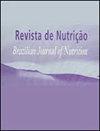在巴西东北地区家庭保健战略的帮助下,老年人的粮食不安全和抑郁症状
IF 0.5
4区 医学
Q4 NUTRITION & DIETETICS
Revista De Nutricao-brazilian Journal of Nutrition
Pub Date : 2023-05-29
DOI:10.1590/1678-9865202336e220197
引用次数: 0
摘要
摘要目的本研究旨在探讨老年人家庭抑郁症状与食物不安全之间的关系。方法:这是一项横断面定量研究,在巴西东北部一个城市的家庭健康战略中对社区居住的老年人进行了研究。使用老年抑郁症量表评估抑郁症状,使用巴西食品不安全量表评估食品不安全。采用卡方检验进行双变量分析,采用二元逻辑回归验证抑郁症状与食品不安全之间的关联,并对潜在的混杂变量进行了调整。显著性水平p<0.05。结果共评估316例老年人,平均年龄70.5岁(±7.5岁)。抑郁症状的患病率为27.5%,粮食不安全的患病率为63.3%,有老年人的家庭中有25.6%处于中度/重度不安全状态。在多变量分析中,经历轻度食品不安全的家庭出现了3次(OR: 3.02;95% CI: 1.42-6.39)出现抑郁症状的几率更高,而在经历中度/重度粮食不安全的人群中,出现抑郁症状的几率高出5倍(OR: 5.01;95% ci: 2.30-10.92)。结论:在有家庭健康战略老年人的家庭中,粮食不安全与抑郁症状之间存在关联,经历中度/重度粮食不安全的家庭出现抑郁症状的可能性更大。本文章由计算机程序翻译,如有差异,请以英文原文为准。
Food insecurity and depressive symptoms among older adults assisted by the Family Health Strategy in the Northeast region of Brazil
ABSTRACT Objective This study aimed to investigate the association between depressive symptoms and food insecurity in households with older adults. Methods This is a cross-sectional, quantitative study conducted with community-dwelling older adults attended to in the Family Health Strategy in a municipality in the Brazilian Northeast. Depressive symptoms were evaluated using the Geriatric Depression Scale and food insecurity was assessed using the Brazilian Food Insecurity Scale. The chi-squared test was applied for a bivariate analysis and binary logistic regression was used to verify the association between depressive symptoms and food insecurity, adjusted for potential confounding variables. The significance level was p<0.05. Results A total of 316 older adults were evaluated, with a mean age of 70.5 (±7.5 years). The prevalence of depressive symptoms was 27.5% and that of food insecurity was 63.3%, with 25.6% of households with older adults experiencing moderate/severe insecurity. In the multivariate analysis, households experiencing mild food insecurity presented 3 times (OR: 3.02; 95% CI: 1.42-6.39) more chance of developing depressive symptoms, while in those experiencing moderate/severe food insecurity the chance was 5 times higher (OR: 5.01; 95% CI: 2.30-10.92). Conclusion An association was found between food insecurity and depressive symptoms in households with older adults of the Family Health Strategy, with more chances for those experiencing moderate/severe food insecurity.
求助全文
通过发布文献求助,成功后即可免费获取论文全文。
去求助
来源期刊
CiteScore
1.20
自引率
12.50%
发文量
24
审稿时长
6-12 weeks
期刊介绍:
Revista de Nutrição is former Revista de Nutrição da Puccamp, founded in 1988. It is a bimonthly publication every four months and it is of responsibility of the Centro de Ciências da Vida, da Pontifícia Universidade Católica de Campinas . It publishes articles that contribute to the study of Nutrition in its many sub-areas and interfaces; and is open to contributions of the national and international scientific communities.

 求助内容:
求助内容: 应助结果提醒方式:
应助结果提醒方式:


